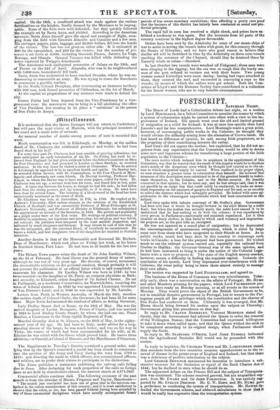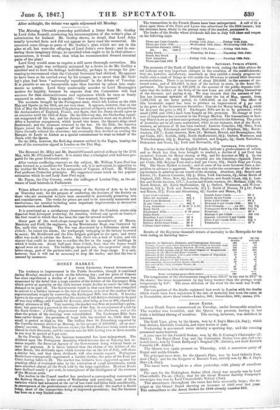POSTSCRIPT.
SATURDAY NIGHT.
The House of Lords had a Colonization debate last night, on a motion by Lord MONTEAGLE, for a Select Committee to consider the means by which a system of colonization might be carried into effect with a view to the ime provement of Ireland. His speech went over the old and limited ground of emigration as a relief for Ireland: it was at once less specific than Lord Lincoln's and far less comprehensive. Lord Monteagle made a great point, however, of encouraging public works in the Colonies: he thought they would obviate the difficulty arising from the alienation of Crown-lands. He had heard no difference of opinion, he said, among Irish proprietors, as to the propriety of their contributing towards the outlay.
Earl GREY did not oppose the motion; but explained, that he did not ac- quiesce from any expectation that the Committee would be able to devise some new and ingenious scheme for transferring a large portion of the Irish population to the Colonies—
The main motive which induced him to acquiesce in the appointment of this Committee, was that he trusted that the result of this inquiry would be to disabuse men's minds of the dangerous error which he thought now existed as to the ex- tent to which emigration might be carried. When confined to its proper object, no man attached a greater value to colonization than himself. He believed that measures of this description were calculated to be of the greatest benefit to indivi- duals themselves, to the Colonies, and to the Mother-country. He heartily concurred in that opinion; but Ile must say, and he had always said, that it was
not possible by an emigr tion that could safely Le conducted, to make an imme- diate impression on the numbers of paupers in England and Ire and, MI as sensibly to relieve the distress which bad unhappily prevailed. He looked with some ap- prehension to the extravagant expectations which had been entertained on this subject. Lord Grey spoke with infinite contempt of Mr. Godley's plan. Government had been told that it would be brought forward in the other House by a noble
Earl; but when the motion was actually made, the noble Lord caused it to be understood that he had nothing to do with the scheme: it was repudiated by every person in Parliament—universally and anxiously repudiated. Let it then slumber on dusty shelves, in that limbo to which such visionary and impractica- ble projects are, as the poet tells us, consigned. He was not oppceed to a sound plan of emigration; but he deprecated the aiscouragement of spontaneous emigration, which is aided by large sums sent from those who have emigrated to their friends at home. As to public works, much had been done by this country to encourage such works in Canada: a loan for the purpose had been guaranteed. Be wished much to see the railroad system carried out, especially the railroad from Quebec to Halifax: the Governor-General was of the same opinion, and he had been instructed to bring it under the notice of the Colonial Legis- lature with a view to promote it. The state of the English money-market, however, causes a difficulty in finding the requisite capital. Towards the conclusion of his speech, Lord Grey deprecated over-interference with the Colonies; the wiser policy being to leave them almost entirely to manage their own affairs.
The motion was supported by Lord PITZWILLIAM; and agreed to.
The business of the House of Commons was very miscellaneous. Toler- ably early, there was a conversation on the affairs of Portugal; Mr. HUME
and other Members pressing for the papers; which Lord PALMERSTON pro- mised to have ready on Monday morning, or at all events in the course of Monday. They would prove the object of the British Government to be, not to establish despotic government in Portugal, but to secure to the Por- tuguese people all the privileges which the constitution and the charter of Don Pedro had conferred on them. Ultimately it was arranged, that Mr. Hume should bring forward his motion upon the subject on Thursday; Government giving him precedence on that day.
In reply to MT. CILAV}.21 BERKELEY, Viscount MORPETH Stated dis- tinctly, that the Government had advised the Queen to order the removal of the Wellington Statue; that the Committee had expressed willingness to take it down when called upon; and that the Queen wished the arch to be completed according to its original design, when Parliament should supply the funds.
In reply to Mr. STAFFORD O'BRIEN, Lord JOHN RUSSELL intimated that the Agricultural Statistics Bill would not be proceeded with this session.
In reply to inquiries, Sir CHARLES WOOD and Mr. LABOUCHERE stated, that accounts from the two countries occasion apprehensions as to the re- newal of disease in the potato crops of England and Ireland; but that there was a deficiency of positive information on the subject. Lord GEORGE BENTINCK announced his intention to introduce a sub- stantive measure for the limitation or repeal of the Bank Charter Act of 1844; but he declined to state when he should do so.
The adjourned debate on the Prisons Bill and the subject of Transporta- tion was continued. The scheme received general, but not unqualified sup- port, from Mr. EWART and Sir JOHN PAKINGTON. It Was entirely Mir ported by Mr. EVELYN DENISON. Mr. G. W. Bo ra and Mr. Huns: gave a preference to continuing the system of transportation. Mr. Hawas de- fended the Government scheme, and adduced calculations to show that it would be really less expensive than the transportation system.
After midnight, the debate was again adjourned till Monday.

























 Previous page
Previous page